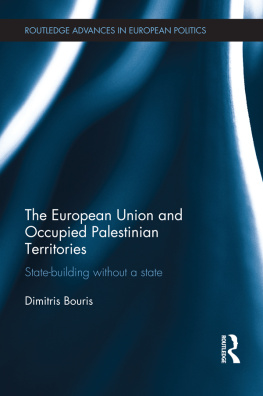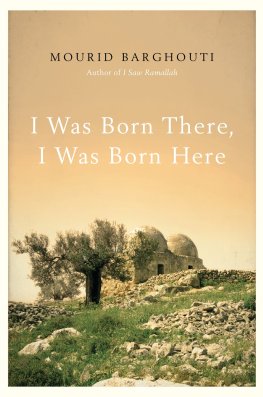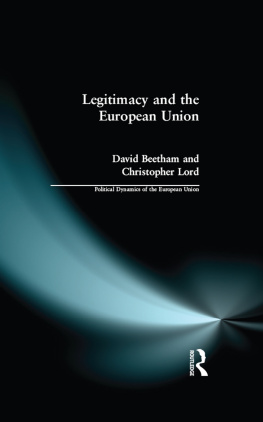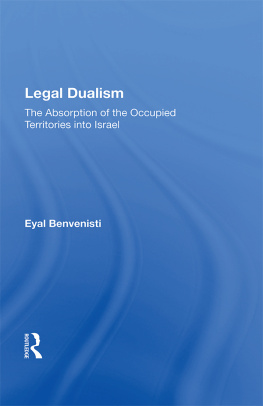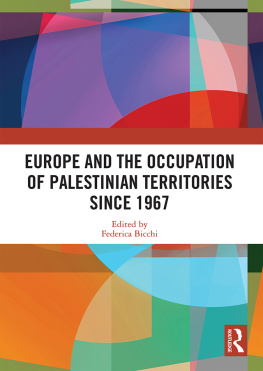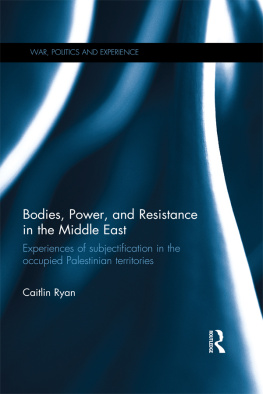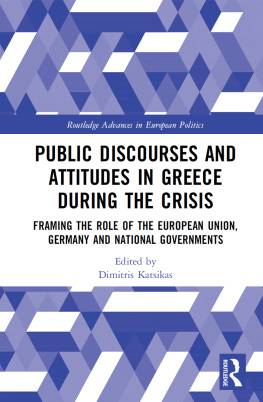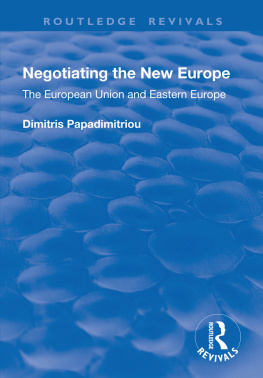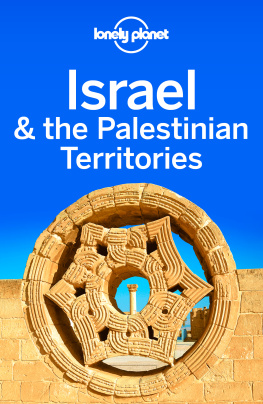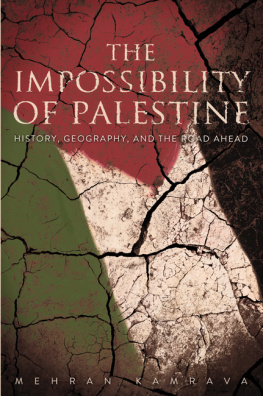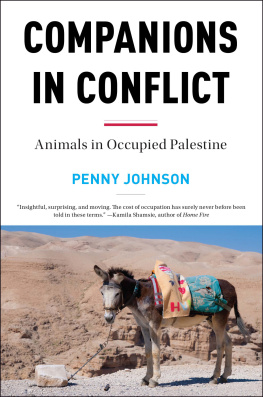Bouriss book is an important contribution to understanding statebuilding in the OPTs because of its focus on the EU, whose central role is often ignored or downplayed. Through his assessment of security sector reform and rule of law promotion, Bouris lays bare the incoherence and inconsistency in EU policy and practices, and shows how statebuilding is not a technical project, but is highly political. He usefully reminds us of how Europe has a major responsibility not only historically for the situation in Israel/Palestine, but also for the current democratic deficit witnessed in the OPTs.
Mandy Turner, Director of the Kenyon Institute in Jerusalem.
Bouris book offers a coherent and detailed assessment of the EUs role in the Palestinian state-building after the Oslo Accords. What makes the book unique is that it places the EU at the centre of the state-building project conducted in the Occupied Palestinian Territories, an endeavor that has so far been missing from the academic literature. The book is based on Bouris exhaustive research providing the reader with crucial empirical material linked to a clear theoretical framework. It is an important contribution, which should be read by scholars, researchers, students and policy-makers across the EU and beyond.
Richard Youngs, Senior Associate Carnegie Endowment for International Peace and Professor of International Relations at Warwick University.
Dimitris Bouris book offers a unique insight into the EUs role in the Palestinian institution-building. The book demonstrates how the different tools like security sector reform and support to the judiciary, and policies of the EU do come together in pursuing the EUs political goal of supporting a two-state solution in the Middle East with Israel and the future Palestinian state living side by side in peace and security. Bouris analysis highlights the EUs indispensable role despite the many drawbacks and pitfalls that come with a long-lasting conflict like the one in the Middle East.
Christian Berger, Director for North Africa, Middle East, Arabian Peninsula, Iran and Iraq, EEAS European External Action Service.
This is an important monograph that advances our knowledge on both conceptual and empirical grounds. Bouris delivers a fascinating account of the EUs engagement with the Palestinian territories that is well informed and sharply analytical. A must-read for those who wish to understand the limitations and opportunities of the European Unions role in the Middle East Peace Process. It is also highly recommended for scholars interested in the wider field of the European Unions external relations and literature on conflict resolution and contested statehood.
Dimitris Papadimitriou, Professor of Politics, University of Manchester.
The European Union and Occupied Palestinian Territories
This book analyses the present European Union (EU) approach to state-building, both in policy and operation. It offers a review of the literature on peace-building EU state-building and conflict resolution, before examining in detail the EUs role as a state-builder in the case of the Occupied Palestinian Territories following the 1993 Oslo Accords.
Drawing on extensive fieldwork and over 140 interviews carried out in Brussels, London, Jerusalem and Ramallah with EU, Palestinian and Israeli officials as well as academics, members of Non-Governmental Organisations (NGOs) and civil society, the author evaluates the present approach of state-building and offers a framework to test the effectiveness of the EU as a state-builder. Examining Security Sector Reform, Judiciary Sector Reform and the rule of law, the book brings the voices from the field to the forefront and measures the contribution of the EU to state-building against a backdrop of ongoing conflict and a polarised social setting.
This book will be of interest to students and scholars of international relations, EU politics, Middle Eastern politics, conflict resolution and state-building.
Dimitris Bouris is Research Fellow at the European Neighbourhood Policy Chair, College of Europe (Natolin) and holds a PhD from the University of Warwick. His research interests include EU external relations (with a particular focus on the Middle East), conflict resolution, state-building and security sector reform.
Routledge Advances in European Politics
1 Russian Messianism
Third Rome, revolution, Communism and after
Peter J.S. Duncan
2 European Integration and the Postmodern Condition
Governance, democracy, identity
Peter van Ham
3 Nationalism in Italian Politics
The stories of the Northern League, 19802000
Damian Tambini
4 International Intervention in the Balkans since 1995
Edited by Peter Siani-Davies
5 Widening the European Union
The politics of institutional change and reform
Edited by Bernard Steunenberg
6 Institutional Challenges in the European Union
Edited by Madeleine Hosli, Adrian van Deemen and Mika Widgrn
7 Europe Unbound
Enlarging and reshaping the boundaries of the European Union
Edited by Jan Zielonka
8 Ethnic Cleansing in the Balkans
Nationalism and the destruction of tradition
Cathie Carmichael
9 Democracy and Enlargement in Post-Communist Europe
The democratisation of the general public in fifteen Central and Eastern European countries, 19911998
Christian W. Haerpfer
10 Private Sector Involvement in the Euro
The power of ideas
Stefan Collignon and Daniela Schwarzer
11 Europe
A Nietzschean perspective
Stefan Elbe
12 European Union and E-Voting
Addressing the European Parliaments internet voting challenge
Edited by Alexander H. Trechsel and Fernando Mendez
13 European Union Council Presidencies
A comparative perspective
Edited by Ole Elgstrm
14 European Governance and Supranational Institutions
Making states comply
Jonas Tallberg
15 European Union, NATO and Russia
Martin Smith and Graham Timmins
16 Business, The State and Economic Policy
The case of Italy
G. Grant Amyot
17 Europeanization and Transnational States
Comparing Nordic central governments
Bengt Jacobsson, Per Lgreid and Ove K. Pedersen
18 European Union Enlargement
A comparative history
Edited by Wolfram Kaiser and Jrgen Elvert
19 Gibraltar
British or Spanish?
Peter Gold
20 Gendering Spanish Democracy
Monica Threlfall, Christine Cousins and Celia Valiente
21 European Union Negotiations
Processes, networks and negotiations
Edited by Ole Elgstrm and Christer Jnsson
22 Evaluating Euro-Mediterranean Relations
Stephen C. Calleya
23 The Changing Face of European Identity
A seven-nation study of (supra) national attachments
Edited by Richard Robyn
24 Governing Europe
Discourse, governmentality and European integration
William Walters and Jens Henrik Haahr
25 Territory and Terror
Conflicting nationalisms in the Basque country
Jan Mansvelt Beck

